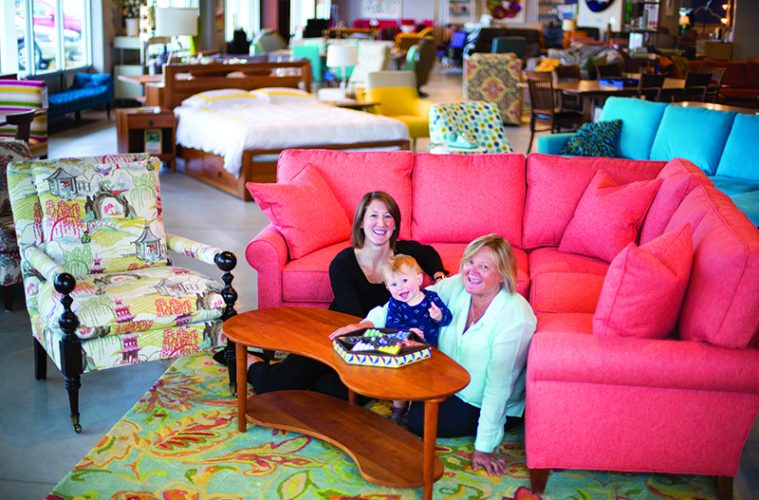In a sea of big-box stores whose often cheaply made furniture can’t stand the test of time, Circle Furniture offers an alternative. Family-owned since 1952, the company’s seven locations serve the entire Greater Boston area with well-made, sustainably created furniture.
Peggy Burns, aka “Queen Bee,” who owns the company alongside her husband, Richard Tubman, and brother-in-law, Harold Tubman, explains, “We have countless reasons for going green: concerns for the planet, reducing cost and waste in our business practices, and even the health issues that have been proven to arise with the chemicals used on some furniture.”
Circle Furniture has a history of keeping their business practices simple, family-oriented, and eco-friendly. Kicking off a 60-year legacy with their first location in Cambridge, the Tubman family began by giving high-quality used furniture a second chance, as well as offering consumers the opportunity to customize their own pieces by selling unfinished tables, chairs, bookcases, and more. “Back then, people wanted real wood and a project to finish. As the need developed for more high-quality new furniture, ready to be used, we started carrying more local products in more locations,” says Burns, who joined Tubman in the business in 1985. “There was a great demand for furniture that was beautiful, functional, and eco-friendly wherever possible.” Thus began the Circle Furniture tradition of choosing pieces that display superior craftsmanship with minimal environmental impact.
Although the company has focused on high-end products since the very beginning, it started adopting sustainable practices seriously in the early 2000s. “We started by trying to go it alone,” says Burns. “We found some sustainable vendors, but not as many as we would have liked.” That changed in 2006, when Burns attended a meeting of what would soon become the Sustainable Furnishings Council, an organization that has expanded to include over 400 eco-minded businesses from around the country. Burns, a member of the Council’s board, explains, “We’re a resource for consumers, manufacturers, and suppliers. Well-made, sustainable furniture can come from anywhere in the world—as long as companies have access to information about up-to-date sustainable practices.” The Council’s mission is fourfold: raising awareness about sustainability, helping companies adopt more sustainable practices, gathering and providing comprehensive information for both businesses and consumers, and matching eco-minded customers with sustainable companies.
At the heart of Circle Furniture’s philosophy is the family’s commitment to choosing local vendors whenever possible. “We get our pieces from vendors that we trust, and that we have good business relationships with,” says Burns. “Finding beautiful furniture from sources who keep their practices transparent allows us to be transparent with customers. If somebody has a question about one of our pieces, we’ll either know the answer or we can find that answer right from the source.”
Circle Furniture partners with companies like Lee Industries, which uses reclaimed wood and steel for sofa and bed frames, recycled soda bottles to stuff cushions, and water-based stains on wooden furniture, rather than harsh, harmful chemicals. Dining sets by Copeland Furniture use sustainably harvested woods certified by the Forest Stewardship Council, as do many of Circle Furniture’s other vendors. Burns adds, “We also look for companies that don’t generate excess waste in their manufacturing process. Copeland Furniture, CR Laine, and many others follow the ‘lean manufacturing’ philosophy, reducing waste and reusing scraps.” Circle Furniture also works with many smaller vendors in Vermont, Maine, and New Hampshire, following their promise to cut down on energy wasted by shipping products overseas or across the country.
Sustainability is not a burden at Circle Furniture, but rather an opportunity—a win-win for both customer and business owner. Proper recycling processes cut down on waste removal costs, which in turn reduces costs for customers. Circle Furniture requires that vendors who ship cushions and other upholstered pieces use thin reusable covers rather than bulky Styrofoam or plastic packing materials. “Some companies have to see a dollar value before they adopt sustainable practices. We began our sustainable practices before we knew how cost-effective it could be, but we’ve found that reducing our energy costs and recycling our materials saves money for the business and for the consumer,” Burns explains. Sustainable furnishings can be a boon for a thrifty consumer: High-quality furniture that stands up to wear and tear won’t need to be replaced after just a few years. “There’s a lot of cheap furniture out there. But customers are really better off buying higher-quality new or even used pieces than cut-rate pieces that will fall apart and end up in a landfill.”
At Circle Furniture, sustainability is a family affair—as is choosing a great piece of furniture. Burns’s daughter and niece have joined the business, creating a three-generation legacy of low-impact furniture with high-impact style. “Our goal is to help you create the room you want,” Burns says. “But we also focus on using the right resources. It’s our responsibility to pass the planet on, and we all want there to be something left for our grandchildren.”
Article appears in the Fall 2015 issue of Northshore Home magazine.

